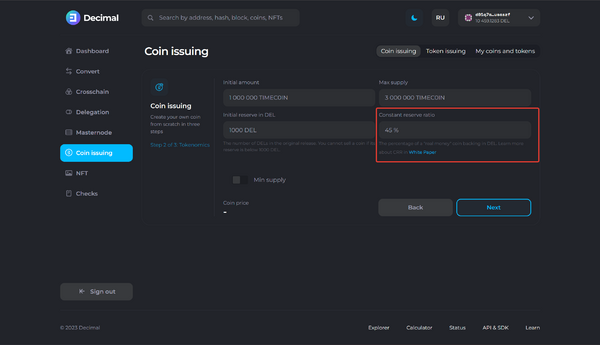Instruction:Defining CRR when creating a coin: Difference between revisions
| [checked revision] | [checked revision] |
(Created page with "{{#seo: |title= What is CRR (Cash Reserve Ratio) |titlemode=append |keywords= What is CRR (Cash Reserve Ratio) |description= Decimal instruction. What is CRR (Cash Reserve Ratio) }} <div class="mikio-article-content"> <div class="mikio-tags"> </div> <span id="What is CRR"></span> = What is CRR = The '''Cash Reserve Ratio (CRR)''' is used in the second step (Tokenomics) when creating a coin:</br> File:What_is_CRR_(Cash_Reserve_Ratio)_1.png...") |
CryptoUser (talk | contribs) No edit summary |
||
| Line 1: | Line 1: | ||
{{#seo: | {{#seo: | ||
|title= | |title= Defining CRR when creating a coin — manual of Decimal Wiki | ||
|titlemode=append | |titlemode=append | ||
|keywords= | |keywords= Defining CRR when creating a coin | ||
|description= Decimal | |description= Decimal Manual. Defining CRR when creating a coin | ||
}} | }} | ||
{{manual-console}} | |||
{{main article|CRR}} | |||
The '''Constant Reserve Ratio ([[CRR]])''' is used in the second step ([[Tokenomics]]) when [[instructions:Issue_coin|creating a coin]]: | |||
[[File:What_is_CRR_(Cash_Reserve_Ratio)_1.png|600px|thumb]] | |||
== Defining CRR when creating a coin == | |||
= | |||
When creating a [[coin]] in [[DecimalChain]], defining the CRR (Constant Reserve Ratio) plays an important role. CRR determines the percentage of [[reserve]] that will be reserved in the [[base coin]], '''[[DEL]]''', for each [[issue]]d [[custom coin]]. | |||
[[ | |||
=== Steps to define CRR when creating a coin: === | |||
[[Category: | '''1. Determine the desired [[liquidity]] level:''' Decide how stable you want to make your coin. You can choose a CRR ranging from 10% to 100%. | ||
'''2. Consider [[volatility]]:''' Take into account that a higher reserve percentage (higher CRR) will reduce the volatility of the coin, while a lower reserve percentage (lower CRR) will result in higher volatility. | |||
{{hint|You can learn more about the calculation formulas in the '''[[Decimal White Paper|White Paper]]''' ([https://decimalchain.com/WPeng.pdf link]) and you can see how the price of your token will change when buying or selling by using the '''Calculator section''' ([https://calculator.decimalchain.com/ link]) and setting different initial parameters. This will help you forecast the economic model of your token and understand which parameters to set when creating your token, as coin liquidation is not possible on the [[DecimalChain]] [[blockchain]].}} | |||
'''3. Make a decision:''' Determine the percentage of reserve you want to allocate for your custom coin. This will be your CRR. | |||
'''4. Deploy the coin:''' After defining the CRR, you can launch your coin on the DecimalChain network with the specified reserve level. | |||
{{!!!}} Remember that CRR is an important parameter that determines the liquidity and volatility of your coin in the DecimalChain network. | |||
[[Category:Manuals]] | |||
Revision as of 09:55, 2 February 2024
| This is a page with the instruction guide to the Decimal Console. |
Main article: CRR
The Constant Reserve Ratio (CRR) is used in the second step (Tokenomics) when creating a coin:

Defining CRR when creating a coin
When creating a coin in DecimalChain, defining the CRR (Constant Reserve Ratio) plays an important role. CRR determines the percentage of reserve that will be reserved in the base coin, DEL, for each issued custom coin.
Steps to define CRR when creating a coin:
1. Determine the desired liquidity level: Decide how stable you want to make your coin. You can choose a CRR ranging from 10% to 100%.
2. Consider volatility: Take into account that a higher reserve percentage (higher CRR) will reduce the volatility of the coin, while a lower reserve percentage (lower CRR) will result in higher volatility.
3. Make a decision: Determine the percentage of reserve you want to allocate for your custom coin. This will be your CRR.
4. Deploy the coin: After defining the CRR, you can launch your coin on the DecimalChain network with the specified reserve level.
![]() Remember that CRR is an important parameter that determines the liquidity and volatility of your coin in the DecimalChain network.
Remember that CRR is an important parameter that determines the liquidity and volatility of your coin in the DecimalChain network.